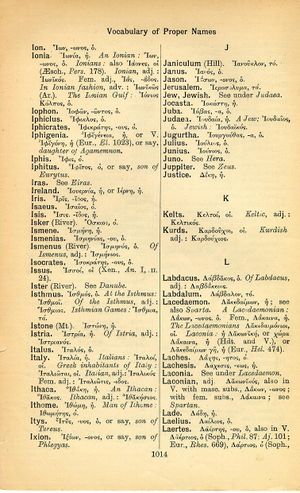Iris
Ἔοικα γοῦν τούτου γε σμικρῷ τινι αὐτῷ τούτῳ σοφώτερος εἶναι, ὅτι ἃ μὴ οἶδα οὐδὲ οἴομαι εἰδέναι → I seem, then, in just this little thing to be wiser than this man at any rate, that what I do not know I do not think I know either
English > Greek (Woodhouse)
Ἶρις, -ιδος, ἡ.
Latin > English (Lewis & Short)
Īris: is or idis (acc. Irim, Verg. A. 4, 694: Irin, Ov. and App.), f., = Ἶρις,>
I the goddess of the rainbow, daughter of Thaumas and Electra, the sister of the Harpies, and the swift-footed messenger of the gods: Irim de caelo misit Saturnia Juno, Verg. A. 5, 606; 4, 700; 9, 803; Ov. M. 1, 271; 11, 631; 14, 830 al.— Voc. Irī, Ov. M. 11, 585.—
II Transf.
A The rainbow: Irin vulgo arcus esse aiunt, quando imago solis vel imago lunae umidam et cavam nubem densamque ad instar speculi colorat, etc., App. de Mundo, 16, p. 64, 10; cf. Sen. Q. N. 1, 3, 1 sqq.: iris erat in circuitu sedis, Vulg. Apoc. 4, 3; Amm. 20, 11, 26. —
B A sweet-smelling plant, perh. the sword-lily, Plin. 21, 7, 19, § 40; Col. 12, 27; 12, 53, 2; Pall. 1, 37, 2. —
C (Iris stone.) A precious stone, prob. a very pure six-sided prismatic crystal, Plin. 37, 9, 52, § 136. —
D A river that flows into the Euxine Sea, Plin. 6, 3, 3, § 8; Val. Fl. 4, 600.
Latin > French (Gaffiot 2016)
(1) Īris,¹³ is et ĭdis, f. (Ἶρις), fille de Thaumas et d’Électre et messagère de Junon : Virg. En. 5, 606 ; Ov. M. 1, 271.
(2) Iris, m., fleuve d’Asie qui se jette dans le Pont-Euxin : Plin. 6, 8.

